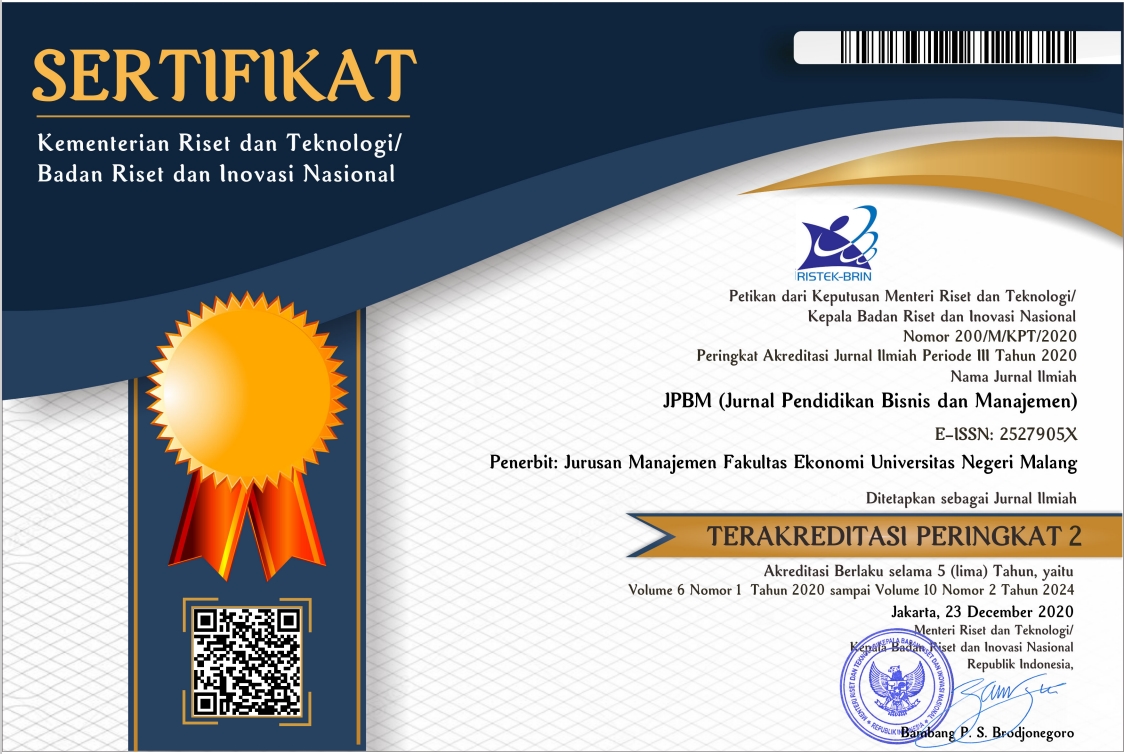Assessing the Relevance of Spirituality and Corporate Social Responsibility in A Family Business: A Scooping Review
Abstract
Previous literature review studies have explored the implementation of social responsibility in family companies, while literature reviews that focus explicitly on the spirituality of family business in the implementation of social responsibility have not been found. The purpose of this scoping review is to map out studies that assess the spirituality of family business in the implementation of social responsibility. The scoping review of this study follows the five main stages outlined by Arkset and O'Malley (2005). The steps taken are (1) identifying research questions; (2) identify relevant studies; (3) selection of relevant studies; (4) mapping data; (5) Compile, summarize and report the results. The studies reviewed were selected from three electronic databases, namely: Emerald, Springer and Taylor & Francis within a period of 12 years from 2012-2021. The results of the scoping review show that most studies acknowledge that spirituality in family establishments is stronger. Social responsibility decisions and policies are considered as ethical decisions that involve the influence of religion and spirituality as the basis for decision making. The spiritual values that are built in family business can be the basis for the implementation of social responsibility that is oriented to the long-term goal of corporate sustainability. The theoretical implication of this research is to provide additional literature on CSR in family companies in terms of spirituality so that it can be a guide for future research.
Keywords: Corporate Social Responsibility, Spirituality, Family Business, Scooping ReviewFull Text:
PDFReferences
Abdelgawad, S. G., & Zahra, S. A. (2020). Family Firms’ Religious Identity and Strategic Renewal. Journal of Business Ethics, 163(4), 775–787. https://doi.org/10.1007/s10551-019-04385-4
Aguinis, H., & Glavas, A. (2012). What We Know and Don’t Know About Corporate Social Responsibility: A Review and Research Agenda. Journal of Management, 38(4), 932–968. https://doi.org/10.1177/0149206311436079
Ahmad, S., Siddiqui, K. A., & AboAlsamh, H. M. (2020). Family SMEs’ survival: the role of owner family and corporate social responsibility. Journal of Small Business and Enterprise Development, 27(2), 281–297. https://doi.org/10.1108/JSBED-12-2019-0406
Amann, B., Jaussaud, J., & Martinez, I. (2012). Corporate social responsibility in Japan: Family and non-family business differences and determinants. Asian Business and Management, 11(3), 329–345. https://doi.org/10.1057/abm.2012.6
Arksey, H., & O’Malley, L. (2005). Scoping studies: Towards a methodological framework. International Journal of Social Research Methodology: Theory and Practice, 8(1), 19–32. https://doi.org/10.1080/1364557032000119616
Astrachan, J. H., Binz Astrachan, C., Campopiano, G., & Baù, M. (2020). Values, Spirituality and Religion: Family Business and the Roots of Sustainable Ethical Behavior. Journal of Business Ethics, 163(4), 637–645. https://doi.org/10.1007/s10551-019-04392-5
Barron, K., & Chou, S. Y. (2017). Spirituality and social responsibility performance: The perspectives of religiously and non-religiously affiliated individuals. Journal of Global Responsibility, 8(1), 63–82. https://doi.org/10.1108/JGR-07-2016-0020
Baumgartner, R. J. (2014). Managing corporate sustainability and CSR: A conceptual framework combining values, strategies and instruments contributing to sustainable development. Corporate Social Responsibility and Environmental Management, 21(5), 258–271. https://doi.org/10.1002/csr.1336
Bhatnagar, N., Sharma, P., & Ramachandran, K. (2020). Spirituality and Corporate Philanthropy in Indian Family Firms: An Exploratory Study. Journal of Business Ethics, 163(4), 715–728. https://doi.org/10.1007/s10551-019-04394-3
Bowen, H. (1953). Social Responsibilities of the Businessman Harper & Row. In New York.
Bowen, H. R. (2018). Why Are Businessmen Concerned About Their Social Responsibilities? (Continued). Social Responsibilities of the Businessman, 15(1), 84–105. https://doi.org/10.2307/j.ctt20q1w8f.14
Bruch, H., & Walter, F. (2005). The keys to rethinking corporate philanthropy. MIT Sloan Management Review, 47(1).
Burke, L., & Logsdon, J. M. (1996). How Corporate Social Responsibility Pays Off. Long Range Planning, 29(4), 495–502. https://doi.org/10.1016/0024-6301(96)00041-6
Canavati, S. (2018). Corporate social performance in family firms: a meta-analysis. Journal of Family Business Management, 8(3), 235–273. https://doi.org/10.1108/JFBM-05-2018-0015
Carroll, A. B. (1999). Corporate social responsibility: Evolution of a definitional construct. Business and Society, 38(3), 268–295. https://doi.org/10.1177/000765039903800303
Carroll, A. B. (2017). A three-dimensional conceptual model of corporate performance. Corporate Social Responsibility, 4(4), 37–45. https://doi.org/10.5465/amr.1979.4498296
Devie, D., Liman, L. P., Tarigan, J., & Jie, F. (2018). Corporate social responsibility, financial performance and risk in Indonesian natural resources industry. Social Responsibility Journal, 16(1), 73–90. https://doi.org/10.1108/SRJ-06-2018-0155
El-Kassar, A. N., ElGammal, W., & Fahed-Sreih, J. (2018). Engagement of family members, corporate governance and social responsibility in family-owned enterprises. Journal of Organizational Change Management, 31(1), 215–229. https://doi.org/10.1108/JOCM-06-2017-0238
Fathallah, R., Sidani, Y., & Khalil, S. (2020). How Religion Shapes Family Business Ethical Behaviors: An Institutional Logics Perspective. Journal of Business Ethics, 163(4), 647–659. https://doi.org/10.1007/s10551-019-04383-6
Galbreath, J. (2009). Building corporate social responsibility into strategy. European Business Review, 21(2), 109–127. https://doi.org/10.1108/09555340910940123
Galdeano-Gómez, E., Pérez-Mesa, J. C., & Aznar-Sánchez, J. A. (2016). Internationalisation of SMEs and simultaneous strategies of cooperation and competition: an exploratory analysis. Journal of Business Economics and Management, 17(6), 1114–1132. https://doi.org/10.3846/16111699.2014.959040
Ghobadian, A., Money, K., & Hillenbrand, C. (2015). Corporate Responsibility Research: Past—Present—Future. Group and Organization Management, 40(3), 271–294. https://doi.org/10.1177/1059601115590320
Hidayah, R., & Khafid, M. (2016). A Critical Review on Concept Developments of Corporate Social Responsibility Implementation in Enterprises. Review of Integrative Business and Economics Research, 5(1), 340–345.
Hill, P. C., Pargament, K. I., Hood, R. W., Mccullough, M. E., Swyers, J. P., Larson, D. B., & Zinnbauer, B. J. (2000). Conceptualizing religion and spirituality: Points of commonality, points of departure. Journal for the Theory of Social Behaviour, 30(1), 51–77. https://doi.org/10.1111/1468-5914.00119
Iaia, L., Vrontis, D., Maizza, A., Fait, M., Scorrano, P., & Cavallo, F. (2019). Family businesses, corporate social responsibility, and websites: The strategies of Italian wine firms in talking to stakeholders. British Food Journal, 121(7), 1442–1466. https://doi.org/10.1108/BFJ-07-2018-0445
Izzo, M. F., & Ciaburri, M. (2018). Why do they do that? Motives and dimensions of family firms’ CSR engagement. Social Responsibility Journal, 14(3), 633–650. https://doi.org/10.1108/SRJ-08-2017-0148
Kavas, M., Jarzabkowski, P., & Nigam, A. (2020). Islamic Family Business: The Constitutive Role of Religion in Business. Journal of Business Ethics, 163(4), 689–700. https://doi.org/10.1007/s10551-019-04384-5
Kellermanns, F. W. (2013). Spirituality and religion in family firms. Journal of Management, Spirituality and Religion, 10(2), 112–115. https://doi.org/10.1080/14766086.2013.807688
Kim, A., & Lee, Y. (2018). Family firms and corporate social performance: evidence from Korean firms. Asia Pacific Business Review, 24(5), 693–713. https://doi.org/10.1080/13602381.2018.1473323
Lamb, N. H., & Butler, F. C. (2018). The Influence of Family Firms and Institutional Owners on Corporate Social Responsibility Performance. Business and Society, 57(7), 1374–1406. https://doi.org/10.1177/0007650316648443
Lankoski, L. (2008). Corporate responsibility activities and economic performance: A theory of why and how they are connected. Business Strategy and the Environment, 17(8), 536–547. https://doi.org/10.1002/bse.582
Lantos, G. P. (2002). The ethicality of altruistic corporate social responsibility. Journal of Consumer Marketing, 19(3), 205–232. https://doi.org/10.1108/07363760210426049
Madison, K., & Kellermanns, F. W. (2013). Is the spiritual bond bound by blood? An exploratory study of spiritual leadership in family firms. Journal of Management, Spirituality and Religion, 10(2), 159–182. https://doi.org/10.1080/14766086.2012.758052
Mariani, M. M., Al-Sultan, K., & De Massis, A. (2021). Corporate social responsibility in family firms: A systematic literature review. Journal of Small Business Management, 00(00), 1–55. https://doi.org/10.1080/00472778.2021.1955122
Matten, D., & Moon, J. (2008). “Implicit” and “explicit” CSR: A conceptual framework for a comparative understanding of corporate social responsibility. Academy of Management Review, 33(2), 404–424. https://doi.org/10.5465/AMR.2008.31193458
Maung, M., Miller, D., Tang, Z., & Xu, X. (2020). Value-Enhancing Social Responsibility: Market Reaction to Donations by Family vs. Non-family Firms with Religious CEOs. Journal of Business Ethics, 163(4), 745–758. https://doi.org/10.1007/s10551-019-04381-8
McWilliams, A., & Siegel, D. (2001). Corporate Social Responsibility: A Theory of the Firm Perspective. The Academy of Management Review, 26(1). https://doi.org/10.2307/259398
Michikazu Aoi, S. A. (2015). Family firms, firm characteristics, and corporate social performance: A study of public firms in Japan. Journal of Family Business Management, 34(1), 1–5.
Mitchell, R. K., Robinson, R. E., Marin, A., Lee, J. H., & Randolph, A. F. (2013). Spiritual identity, stakeholder attributes, and family business workplace spirituality stakeholder salience. Journal of Management, Spirituality and Religion, 10(3), 215–252. https://doi.org/10.1080/14766086.2012.758054
Moura-Leite, R. C., & Padgett, R. C. (2011). Historical background of corporate social responsibility. Social Responsibility Journal, 7(4), 528–539. https://doi.org/10.1108/1747111111117511
Neal, J., & Vallejo, M. C. (2008). Family firms as incubators for spirituality in the workplace: Factors that nurture spiritual businesses. Journal of Management, Spirituality and Religion, 5(2), 115–159. https://doi.org/10.1080/14766080809518697
Obalola, M. (2008). Beyond philanthropy: Corporate social responsibility in the Nigerian insurance industry. Social Responsibility Journal, 4(4), 538–548. https://doi.org/10.1108/17471110810909939
Pieper, T. M., Williams, R. I., Manley, S. C., & Matthews, L. M. (2020). What Time May Tell: An Exploratory Study of the Relationship Between Religiosity, Temporal Orientation, and Goals in Family Business. Journal of Business Ethics, 163(4), 759–773. https://doi.org/10.1007/s10551-019-04386-3
Pintian, Lv, Y., & Mitra, D. (2020). Csr and performance of family businesses: A systematic review. Australasian Accounting, Business and Finance Journal, 14(3), 75–85. https://doi.org/10.14453/aabfj.v14i3.6
Porter, M. E., & Kramer, M. R. (2006). Strategy & society: The link between competitive advantage and corporate social responsibility. Harvard Business Review, 84(12). https://doi.org/10.1108/sd.2007.05623ead.006
Preslmayer, C., Kuttner, M., & Feldbauer-Durstmüller, B. (2018). Uncovering the research field of corporate social responsibility in family firms: a citation analysis. Journal of Family Business Management, 8(2), 169–195. https://doi.org/10.1108/JFBM-10-2017-0032
Randerson, K. (2022). Conceptualizing family business social responsibility. Technological Forecasting and Social Change, 174. https://doi.org/10.1016/j.techfore.2021.121225
Safaee Chalkasra, L. S., Rivera, J. P. R., & Basuil, D. A. T. (2019). A Review of Theoretical Perspectives on CSR Among Family Enterprises. Vision, 23(3), 225–233. https://doi.org/10.1177/0972262919860966
Santos, M. M. (2016). Strategic CSR: an integrative model for analysis. Social Responsibility Journal, 12(2).
Schwartz, M. S., & Caroll, A. B. (2003). Philosophy Documentation Center. Philosophy, 13(4), 503–530.
Schwartz, M. S., & Carroll, A. B. (2008). Integrating and unifying competing and complementary frameworks: The search for a common core in the business and society field. Business and Society, 47(2), 148–186. https://doi.org/10.1177/0007650306297942
Spence, L. J. (2003). SMEs, Social Capital and the Common Good. Journal of Business Ethics, 45(1–2), 93–108. https://doi.org/10.1023/A:1024176613469
Tabor, W., Madison, K., Marler, L. E., & Kellermanns, F. W. (2020). The Effects of Spiritual Leadership in Family Firms: A Conservation of Resources Perspective. Journal of Business Ethics, 163(4), 729–743. https://doi.org/10.1007/s10551-019-04379-2
Valor, C. (2007). A global strategic plan for corporate philanthropy. Corporate Communications, 12(3), 280–297. https://doi.org/10.1108/13563280710776879
Von Schnurbein, G., Seele, P., & Lock, I. (2016). Exclusive corporate philanthropy: Rethinking the nexus of CSR and corporate philanthropy. Social Responsibility Journal, 12(2), 280–294. https://doi.org/10.1108/SRJ-10-2014-0149
Yu, W., & Hu, H. (2014). Corporate Social Responsibility in Bangladesh: Practice and perpetuity. Corporate Social Responsibility in Asia, 3–18. https://doi.org/10.1007/978-3-319-01532-3
Yusof, M., Mohd Nor, L., & Edward Hoopes, J. (2014). Virtuous CSR: an Islamic family business in Malaysia. Journal of Family Business Management, 4(2), 133–148. https://doi.org/10.1108/JFBM-07-2013-0016
Zeng, T. (2020). Corporate social responsibility (CSR) in Canadian family firms. Social Responsibility Journal, 17(5), 703–718. https://doi.org/10.1108/SRJ-12-2019-0410
Zhou, L., Zhou, L., Studies, C. M., Wang, X., Yu, Y., Choi, Y., Studies, C. M., Wang, X., Huang, S. K., Yang, C., Studies, C. M., Wang, X., Berger, R., & Studies, C. M. (2014). Article information : Chinese Management Studies Social responsibility and employees’ organizational identification in Chinese family firms: Influence of family ownership and family commitment. Chinese Management Studies, 8(4), 683–703.
Refbacks
- There are currently no refbacks.
JPBM (Jurnal Pendidikan dan Bisnis Manajemen) is licensed under a Creative Commons Attribution-NonCommercial-ShareAlike 4.0 International License.
JPBM (Jurnal Pendidikan dan Bisnis Manajemen) is abstracted and indexed in :
















